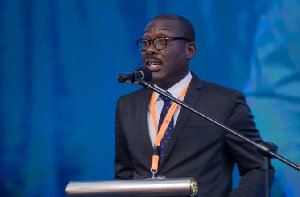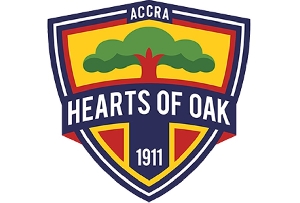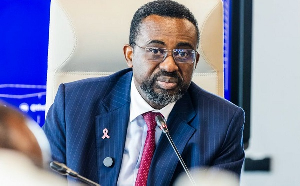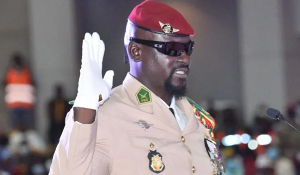THE JUDICIARY AND THE PROMOTION OF DEMOCRACY
IN GHANA: THE 2012 GENERAL ELECTIONS AS A TEST CASE
By Kwame Arhin
Legal Practitioner, Kumasi
And one time Ashanti Regional Chairman of the Public
Tribunal, Kumasi.
E-mail:karhin60@yahoo.com
THE JUDICIARY, they
say, is the bed rock of DEMOCRACY and national development. This saying is to a
very large extent true of the Western democracies such as the United States,
Britain etc. etc., where the judiciary is to a great extent insulated against
the heat and tumbles of politics. Can this be said of countries in Africa
including Ghana?
It
is my view that in recent times the Ghanaian judiciary has enjoyed some amount
of independence but the level of judicial independence will be highlighted the
more at this time that the Supreme Court is going to be confronted with this
electoral case. Is the judiciary going to live up to expectation? Much as we
believe they will live up to
expectation, the answer will largely depend on the caliber of judges that are
going to be empanelled.
After
about three months of intensive electioneering campaign in which the political
parties unfolded to the electorate the good things and programmes they had for
Ghanaians in the event of their being given the mandate to steer the affairs of
the nation for the next four years, Ghanaians on December 7, 2012, went to the
polls to exercise their franchise. Generally, the elections were held in a
peaceful manner.
The
New Patriotic Party, led by Nana Addo Dankwa Akufo-Addo had, according to them,
detected some foul play in the conduct of the elections and as a result wanted
the Electoral Commission to defer the declaration of the results so to enable
them have their grievances redressed. This notwithstanding the Electoral
Commission on December 9, 2012 declared the results with his Excellency John
Dramani Mahama as the winner.
Now,
true to their word, the NPP has taken the matter to the Supreme Court. Now, Nana
Addo-Dankwa Akufo-Addo and others, suing as individuals, among other things,
are challenging the validity of the election of the President which is in
accord with Article 64 (1) of the 1992 national constitution. With this case
the credibility and integrity of the Ghanaian Judiciary is going to be tested.
It is a very high profile case the determination of which calls for legal
brains of the highest caliber.
THE PRACTICE OF
DEMOCRACY IN AFRICA
Democracy
has been simply defined as a government of the people, by the people, for the
people. This is the simplest of definition given to democracy which can easily
be understood by the common man on the street (i.e.) the layman. What it means is
that it is the citizens of a
particular country who through the exercise of their franchise, decide who
should rule or govern them. It is an inalienable right which cannot be taken
away without just cause. It means therefore that real sovereignty rests with
the people. Any attempts therefore to tamper with votes during elections is
seen as a serious threat to democracy and same must seriously be resisted
through due process and not violence. This has often characterized elections in
Africa and it is about time we halted it. Such electoral malpractices make
meaningless the practice of democracy in Africa.
The
late Sir IVOR JENNINGS, one time Vice Chancellor of the University of Cambridge
and a legal luminary in his book “DEMOCRACY IN AFRICA” had this to say
about our practice of Democracy. “When a stone is rolled down a
bare-hill-side, it dislodges other stones, and other stones so dislodged, dislodge
other stones,
so that in the end not a single stone but a cascade of stones reaches the
bottom of the hillside” (emphasis mine).
This
to me is an advice given by the late academic and legal luminary to all and
sundry who desire to practice true democracy. Democracy has numerous virtues
and ideals so that care must often be taken in order not to turn them into
“cascade of stones” which could be worthless.
THE ROLE OF THE
JUDICIARY
The
Judiciary as I have already stated play a major role in democratic dispensation
and nation-building. With this high profile case, our dear nation is on the threshold
of reaching yet another level of our democratic dispensation. It is the courts
we look up to in order to reach that goal. A good decision in this case by the
Supreme Court could place Ghana on a
higher pedestal in our quest for Democracy. It would afford Ghana international
repute.
The
late Benjamin N. Cardozo, one time an associate Justice in the United States Supreme
Court had this to say about the judiciary, “The Judiciary, insulated as it is
against the heat and tumbles of politics, shall be the least dangerous to the
political rights of the people”. By this Justice Cardozo aforementioned meant
that of all the arms of government it is the judiciary which, by its nature, can
champion the rights of the people.
In
his book titled, “THE NATURE OF THE JUDICIAL PROCESS”, Justice Cardozo says that
even though the judge’s powers in
matters of adjudication are enormous and can be subject to abuse, they must in
pursuance of their duties be guided by what he terms JUDICIAL SELF-RESTRAINT. And
judicial Self Restraint takes its roots from the DIGNITY and HONOUR often
associated with the calling. It is an undeniable fact that judges are revered
and dignified by the society.
In
the introduction of his book already cited, at page 16, this is what Justice
Cardozo again says of the role of the
judge in his interpretation of the Law, “The Judge as the interpreter for the
community of its sense of the
Law, must supply omissions, correct
uncertainties and harmonize results with
justice through a sense of free decision”.
Judges
must see themselves as repositories of the law and justice. By the stroke of
the pen of the judge and children yet unborn may be made to suffer hardship,
poverty and misery. In the same vein, the stroke of the pen of the judge can
bring happiness progress, peace and harmony. People look up to Judges for
redress of their grievances. For this reason, we pray that judges who have
courage, good morals and possess analytical mind of the highest caliber are
selected and/or appointed to handle this very high profile case.
COMMENTS ON THE
EFFICACY OF THE COURTS JUDGEMENTS
It
appears to me there is a lot of propaganda going on in respect of the efficacy of
the Supreme Court’s judgment. This has led to the interpretation of the law as
contained in Article 64 of the 1992 constitution. This state of affair, to me,
is most unfortunate. I have seen people who are not versed in the law trying to
interpret the law as they like when even Lawyers can make mistakes in the
interpretation
of the law. This has compelled me as a Lawyer to add my voice to it.
To
begin with, people must see the constitution as the Fundamental or Supreme Law
of the land from which all other statutes derive their source. The constitution
makes provision for the appointment of the Electoral Commission and his staff.
It also makes provision for the President, Vice President, etc, etc.
Article
64 (1) states “The validity of the
election of the President may be challenged only by a citizen of Ghana who may
present a petition for the purpose to the Supreme Court within twenty-one days
after the declaration in respect of which the petition is presented”.
(2)
“A declaration by the Supreme Court that the election of the President is not
valid shall be without prejudice to anything done by the President before the
declaration.”
The
golden rule in the interpretation of the statutes is that it must be
interpreted so to give to it the real intentions of the Legislator. I believe
by inserting that article, the Legislator envisaged a situation whereby there
could be electoral malpractices and for which somebody might desire to
challenge its validity. It means therefore that, the Electoral Commission cannot,
by any stretch of imagination, be said to be the final arbiter in electoral
processes. An aggrieved individual can have recourse to the Supreme Court to
have his grievances redressed.
The
Electoral Commission declared the
results and announced that His Excellency John Dramani Mahama
emerged the winner because, of all the Presidential candidates, he got the
highest number of votes and satisfied the requirements to be made the President.
Now, if at the end of the day the
Supreme Court finds something to the contrary and declares that the election of
His Excellency John Dramani Mahama as President is not valid, then by operation
of law, he cannot be the President. One cannot put something on nothing and
expect it to stand, so said the late Lord Denning MR. The law must be
interpreted in order to correct and clear all uncertainties with the view
to bringing out the real intentions of the legislator.
CONCLUSION
It
is the nation’s prayer that judges who would be selected to handle this case
see it as a very big honor. They should also see it as a national assignment
which demands of them the best of their qualities and capabilities.
I
have to state that in writing these treaties, I do not hold brief for any
political party. I do so from the point of view of a Lawyer and a Human Rights
Activist. I hope in the determination of this matter, there would be no witch-hunting.
If the evidence is not there to support the allegation, the Judges should be bold
to say so. On the other hand, if there is enough evidence to substantiate the
allegation, they should be bold to say so. All we need is fair and sound
judgment that can stand the test of time. The judgment, in the normal course of
things, will open up a new CHAPTER in the country’s quest for a true democracy.
I believe no matter which way the judgment goes it will be good for the
development of our democracy and will as well serve as an eye-opener to other
African countries. At the end of it all the saying that “Law is the just
intervention/ interference of the STATE in the INTERESTS and PASSIONS of
humanity” would have been made manifest.
It
is my prayer that our Judges live up to expectation as they have been doing.
Pix: Author – Lawyer Kwame Arhin
Opinions of Thursday, 10 January 2013
Columnist: Arhin, Kwame














